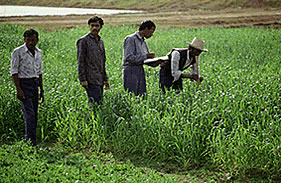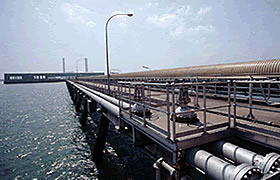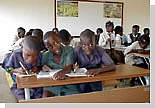| |
Japan's Foreign Policy on Official Development Assistance Speech made by Mr Seiji Kojima, Minister Plenipotentiary, to the Rotary Club of Cambridge
|
|
21 October 2003
|
Thank you, Mr Smith, for your kind introduction.
I have several reasons to feel happy and privileged to have been invited to speak to you today at the oldest Rotary Club in this beautiful university city.
First, Cambridge was virtually the first place in the UK in which I stayed when I attended a summer course for foreign students for a couple of weeks. I arrived here after passing through London exactly 30 years ago, while making my first trip abroad as an overseas trainee of Japan's Ministry of Foreign Affairs. My stay in Cambridge marked the happy beginning of my two years in the UK. I still remember, as if it were only yesterday, playing lawn tennis on a college court for the first time in my life. The green of the court has remained vividly imprinted on my memory. Since then Cambridge has aroused a special feeling in me whenever I have come here.
Second, Cambridge always has been, is and will continue to be one of the foremost intellectual epicentres of the academic world. It is a special privilege for anybody to have the opportunity to make a speech in Cambridge, and one cannot come here without an element of awe.
Third, I have been in the UK for a year and eight months, during which time I have enjoyed lectures, seminars and other events at such prestigious places as Chatham House, Wilton Park and the Ditchley Foundation. At these venues politicians, diplomats, scholars, journalists and even religious leaders discuss various topical subjects frankly and in depth.
They seem quite excited when discussing Europe and America. The Middle East is sometimes addressed, but this tends to be in the context of the participants' deliberations on Europe and America. Poverty in Africa is another theme sometimes taken up in such fora, and I have always thought that this reflected well on the altruism of the British people.
It is quite rare, however, for Asia to be adopted as a main theme for discussion on these occasions, except as regards China in terms of its emergence as an economic power and South Asia as a potential flashpoint. There are not many occasions where Asia's views are expressed, addressed or discussed.
 Therefore, I am very happy to have been given the chance to address the subject of Japan's diplomacy by focusing on its Official Development Assistance (ODA). Therefore, I am very happy to have been given the chance to address the subject of Japan's diplomacy by focusing on its Official Development Assistance (ODA).
I am emphasizing ODA because of the importance Japan places on it in its diplomatic endeavours. In fact, it would not be an exaggeration to say that ODA has long been the major pillar of Japan's diplomacy. In other words, knowledge of Japan's approach to ODA has been and still is a prerequisite for understanding Japan's present and future foreign policy in a deep and accurate manner. |
The Institute of Postgraduate Studies in Agriculture Project implemented by the Japan International Cooperation Agency (JICA)
|
I have another reason for saying that Japan's ODA is a timely and appropriate subject to discuss today. In August this year, the Government of Japan revised the ODA Charter of 1992 [Revision of Japan's ODA Charter], the most important document governing Japan's ODA, which contains among other things objectives, policies, priorities and principles on this subject. |
 The Kilifi Bridge Construction Project (Kenya) constructed with aid from the Japan Bank of International Cooperation (JBIC)
Japan started its ODA in 1954 with an aid budget of about ¥18 million, or about US$50,000, while still borrowing from the World Bank to construct highways, railways and other infrastructural facilities in Japan. Since 1978, we have formulated five medium-term targets, mainly covering the 1980s and '90s. Japan is the only country, as far as I know, to have made an effort to increase its ODA through such a series of targets. |
This approach culminated in Japan becoming the largest donor in the world in 1989. Moreover, except for 1990, Japan's position in this respect was maintained until the year 2000. In 1999, the peak year for Japan, the amount contributed reached US$15.3 billion, accounting for about 30 % of the total amount of ODA disbursed by the members of the Development Assistance Committee (DAC) of the OECD [Japan and the Organisation for Economic Co-operation and Development].
I have referred to ODA as the major pillar of Japan's foreign policy. There are several reasons for this. After World War II, Japan's 'economic miracle' led to a massive balance of payment surplus. At the same time, though, Japan was reluctant to adopt a security profile in Asia or elsewhere in the world that was commensurate with its economic power.
Recognising that stability and prosperity were indispensable among its neighbours if it were to enjoy peace and prosperity, Japan provided most of these countries with a considerable amount of ODA. In fact, Asia has long accounted for a substantial part of Japan's bilateral ODA, and continues to do so - about 70% in 1980 and 57% in 2001.
|
Since the end of the Cold War, the world has changed dramatically and the environment surrounding Japan's ODA has altered accordingly. The world has embraced a set of new problems. With the demise of the Soviet Union, East-West confrontation has disappeared, although the situation in Asia cannot be described in the same way as that in Europe.
|
Many ex-communist countries in Europe, Central Asia and other regions have started to transform their economies by introducing a market orientation. Ethnic rivalries and regional conflicts that were contained under previous regimes and during the period of East-West confrontation have resurfaced [ Archives on East Timor]. |
The Port Klang Power Station Project (Indonesia) constructed with aid from the Japan Bank of International Cooperation (JBIC) |
|
The international community is confronted with terrorism and the proliferation of weapons of mass destruction [Counter Terrorism]. In the world today, there are more than 1.2 billion people who still live in absolute poverty, a situation can easily become a breeding-ground for terrorism. People have become more conscious of the environment [Archives on the Environment]. Global warming is now a shared concern of the international community.
|
If we turn our attention to the domestic arena, it is clear that the surrounding environment is not very encouraging for Japan's ODA. The ODA budget has been decreased by something approaching 30% over the last six years due to Japan's large budgetary deficit. Meanwhile, the Japanese people have become increasing doubtful about the effectiveness of ODA, which no longer enjoys special status in the Government's budgetary process. |
 |
| |
Children in a brand new classroom (Zambia) |
It is my view that, faced with a challenging domestic and international environment, Japan has embarked upon a difficult but worthwhile course.
Let us consider the political front.
First, immediately after the end of the Cold War, Japan dispatched its Self-Defence Forces for the first time to take part in the peacekeeping effort in Cambodia. East Timor provides another example of a similar initiative by Japan [Archives on UN Peace-keeping Operations].
Furthermore, to contribute to the international efforts aimed at the prevention and eradication of terrorism, Japan in October 2001 enacted a special law enabling the Self-Defence Forces to participate in offering assistance to the people affected by it and to engage in co-operative and support activities for the forces of the US, the UK and other countries.
Japan also established another law in July this year, authorising the dispatch of Self-Defence Forces personnel as well as civilians to Iraq in order to assist in the reconstruction of that country. Furthermore, Japan has announced that at the Donors' Conference in Madrid this week it will make a financial commitment of US$ 1.5 billion towards the reconstruction work to be carried out in Iraq in 2004 [Iraq Issue].
Although this is not the subject we are addressing today, let me briefly touch upon co-operation between Japan and the UK in this area. This has been demonstrated symbolically by the provision of fuel by Japanese Maritime Self-Defence Force vessels to British naval ships as well as through the Japan-UK Joint Seminar on Afghanistan held at Wilton Park in October 2002.
In Sierra Leone, Japan has been working closely with the UK to promote the reconciliation of the former combatants. The two countries dispatched a joint fact-finding mission to that country in 2001. Based on the result of the mission, Japan decided last December to contribute to the Community Reintegration Programme led by the UK. This programme aims at fostering reconciliation and reintegration by promoting understanding within the community, by reviving a sustainable economy based on natural resources and by rehabilitating the infrastructure, including access to safe water.
Second, although its endeavours have yet to bear fruit, Japan took the initiative in reforming the United Nations, especially its Security Council, in the early '90s, arguing that the make-up of the UN should reflect the new era [Japan's position on Security Council Reform]. Since then, the need for this has become increasingly evident and more widely understood throughout the world. In this connection, I would like to refer to Japan's financial contribution to the UN. It is, in fact, bigger than those of the UK, France, Russia and China combined, amounting to about 20% of the total UN budget in 2003.
Third, in Asia, Japan has responded positively to the initiative taken by ASEAN members to establish a new forum called the ASEAN Regional Forum (ARF) [Chairman's Statement], where ASEAN and Post-Ministerial Conference members can discuss regional security matters, including confidence-building measures and efforts to enhance military transparency.
I will now consider the ODA front.
The importance of ODA has not diminished as a result of the efforts in the political arena that I have just mentioned. On the contrary, in my view Japan's ODA is expected to play a more important role. The new ODA Charter reads:
"The objective of Japan's ODA is to contribute to the peace and development of the international community, and thereby to help ensure Japan's own security and prosperity."
Moreover, the ODA Charter lists poverty reduction, sustainable growth, addressing global issues and peace-building as priority issues to be tackled through ODA.
In the UK, the main objective of ODA is to eradicate poverty, as stated in the Department for International Development (DFID) White Paper in 1997 and the International Development Bill of 2002.
If the UK's ODA is narrowly defined, this comes, in my view, from the fact that the UK enjoys a different set of policy tools from that of Japan in achieving its diplomatic objectives, reflecting the strengths and limitations of the two countries, with the UK's economic strength being relatively less significant than its other areas of prowess.
On the operational level, however, I do not think that there are big differences between our ODA policy and that pursued by the UK. In fact, we have established an extremely close and co-operative relationship with the DFID. Millennium Development Goals (MDGs) are our common targets.
To respond to criticism of the effectiveness of ODA, not only Japan but other donors as well have been vigorously engaged in aid co-ordination, especially in some of the African countries, based on a strategy paper prepared by each of the recipient countries called the Poverty Reduction Strategy Paper (PRSP). Programme-type assistance, including budget support and a sector-wide approach, is the approach often adopted in these countries. Moreover, the discussion and implementation of harmonisation of donor assistance in order to decrease transaction costs has started. Of course, our approaches are not always identical with those of the DFID. However, we are continuing our efforts to achieve the objectives to which we are all committed.
The involvement of civil society in donor and recipient countries is also an important tool for making aid more effective and accountable. The Government of Japan has developed various programmes to assist non-governmental organizations - from Japan, our donor partners and the recipient countries - in their humanitarian and developmental activities in developing countries.
I hope I have made it clear that Japan has been doing its utmost to make ODA effective through international co-operation as well as by improving its own programmes. Meanwhile, developing countries have reciprocated our efforts by exercising ownership in their own endeavours.
Despite such co-operative efforts, making progress in the quest for development is a daunting task for any country. A former World Bank economist wrote a book in which he called the quest for growth elusive and lamented that there was already widespread disappointment that the quest had not been more successful. However, he continued:
"As long as there are poor nations suffering from pestilence, oppression and hunger, as I describe in the first part of the book, and as long as human intellectual efforts can devise ways to make them richer, the quest must go on."
I could not agree more with the author.
Thank you. |
| Top |
| |
|
|


